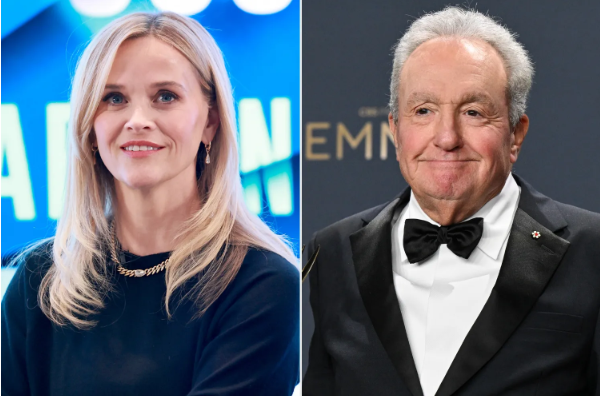Movies
Why Reese Witherspoon Was Asked by Lorne Michaels to Host Saturday Night Live After 9/11
1. A Moment of National Crisis and an Unexpected Call
In the immediate aftermath of the September 11, 2001 terrorist attacks, America was paralyzed with grief. The nation was desperate for healing, unity, and even a momentary return to normalcy. For Saturday Night Live — a show that had long balanced political satire with social reflection — the question of how to return after such tragedy was profound.
It was in that fragile moment that Lorne Michaels, the show’s creator and executive producer, reached out to a young actress named Reese Witherspoon. Just 25 at the time and fresh off the massive success of Legally Blonde, Witherspoon had been scheduled to host later in the season. But Michaels called her personally, asking her to step up earlier — to host the first SNL episode following 9/11.
According to Witherspoon, Michaels’ plea was heartfelt and urgent. He told her, “I really need you to show up. I really, really need this. Rudy Giuliani is going to be here. All the firefighters are going to be here. Paul Simon is going to sing. I just need you to come out and do something a little light and tell America that we’ve got to laugh again.”
That phone call changed the trajectory of her early career. Witherspoon didn’t hesitate. She understood the weight of what Michaels was asking — to help a country find laughter again when laughter felt impossible.
Reflecting on the experience years later, she described the enormity of that responsibility: “It was just too much responsibility for a 24-year-old girl.” Yet she did it, bringing warmth, sincerity, and a touch of levity to a nation still grieving.

2. Returning to the Stage: The Episode That Defined Courage
When the episode aired, Saturday Night Live opened not with a joke, but with a tribute. New York City’s first responders stood side by side with then-Mayor Rudy Giuliani. Music legend Paul Simon performed “The Boxer,” a song of quiet resilience. The air in the studio was thick with emotion — a mix of sorrow and defiance.
Then came Reese Witherspoon.
Stepping onto the stage at 30 Rockefeller Plaza, she faced not just a live audience, but a nation watching closely to see if humor could ever feel right again. Her monologue, gentle and slightly awkward in tone, was designed to provide comfort more than laughter. She later admitted that the experience felt surreal: “I completely left my body,” she said.
Sketches that night tried to balance humor with sensitivity. There were moments that landed and others that didn’t — but the point was never perfection. It was about courage. The decision to move forward, to broadcast live comedy so soon after tragedy, was itself an act of hope.
Lorne Michaels famously said, “Can we be funny?” and Giuliani responded, “Why start now?” That simple exchange between the show’s creator and the city’s mayor summed up the spirit of the night — grim humor as defiance, comedy as resilience.
For Witherspoon, it was a defining moment — not because of how funny the show was, but because of what it represented. She had become part of television history.
3. Reese Witherspoon’s State of Mind: Pressure, Duty, and Humanity
Behind the polished exterior of Hollywood glamour, Witherspoon was under immense pressure. She had recently given birth to her first child and was navigating sudden global fame thanks to Legally Blonde. She was also managing new motherhood, a changing career, and a country in mourning.
When Michaels called, she confessed that her first instinct was to say no — not out of fear, but out of exhaustion. Still, her upbringing and her sense of responsibility prevailed. As she put it, her “Southern and military ethics” didn’t allow her to back down when someone needed her help.
She packed her bags, flew to New York, and stepped into one of the most emotionally charged environments imaginable.
The live broadcast was an emotional blur. There were moments when she could hear the faint sniffles of audience members holding back tears. The sketches were intentionally light — goofy, escapist, and sometimes clumsy. But each one served its purpose: to remind America that laughter was still possible.
Years later, Witherspoon would reflect that the experience changed how she viewed entertainment forever. It was the first time she realized that acting, comedy, and storytelling could serve as a form of healing — not just for the audience, but for the performers themselves.
4. A Defining Cultural Moment: When Comedy Became Courage
The Saturday Night Live episode that Reese Witherspoon hosted stands as one of the most important broadcasts in the show’s history. It marked the first major televised attempt to balance mourning and humor, tragedy and entertainment.
At its core, it was about reclaiming normalcy. The inclusion of firefighters and police officers on stage wasn’t just symbolic — it was personal. Many of the show’s crew members lived in New York; they had friends, family, and neighbors who had been directly affected by the attacks.
Witherspoon’s presence as host brought something vital: warmth, approachability, and a sense of calm. As a young woman who embodied optimism, she helped bridge the emotional gap between solemnity and laughter.
Culturally, that episode set the tone for how television would handle grief moving forward. It showed that art and comedy could coexist with pain, that laughter didn’t erase sorrow but could sit beside it — as a companion to endurance.
From that night forward, SNL became not just a comedy show, but a cultural barometer — reflecting America’s emotions in real time. And Reese Witherspoon, though young and nervous, became an unlikely symbol of that resilience.
5. Legacy and Reflection: What Reese Witherspoon Learned
In the years following that fateful night, Reese Witherspoon would go on to build one of Hollywood’s most successful and respected careers. From Walk the Line to Big Little Lies and The Morning Show, she proved herself not only as a talented actress but as a producer and business leader who championed strong female narratives.
Yet, despite all her accolades, the night she hosted SNL after 9/11 remains one of the most profound experiences of her life. She has said that while she felt terrified at the time, she now sees it as a lesson in courage and perspective.
For nearly fifteen years afterward, she didn’t return to host again — a sign of how deeply that first experience had impacted her. When she finally did return to the stage in 2015, she was older, wiser, and far more comfortable in her own skin. Still, she carried with her the memory of that first time — when comedy met tragedy, and she stood in the middle of it all.
The legacy of that episode isn’t just about Reese Witherspoon or SNL. It’s about the enduring truth that laughter can coexist with loss. It’s about how entertainment, when handled with empathy, can help people heal.
For Reese, that night remains a reminder of why storytelling matters — because even in the darkest moments, the right story, the right laugh, and the right words can help people find their way back to hope.
From: Teetopiaworldus
